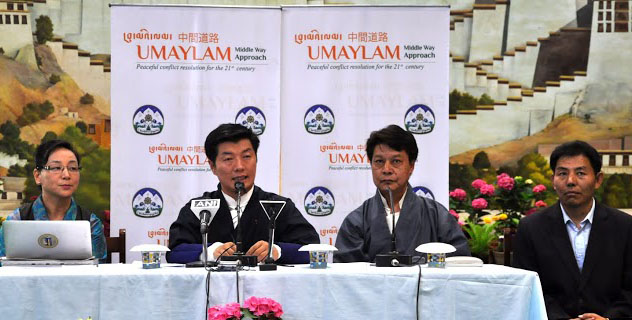
DHARAMSHALA: The US has urged China to engage in unconditional talks with His Holiness the Dalai Lama or his representatives as the Tibetan administration in India reinvigorated its effort to achieve genuine autonomy for the Tibetan people through the Middle Way policy.
The Department of Information & International Relations of the Central Tibetan Administration in Dharamshala launched the Middle Way Approach campaign on Thursday (5 June) to garner wider international support and counter the Chinese government’s propaganda about the policy.
Reacting to the Tibetan leadership’s renewed push to seek genuine autonomy, a Chinese foreign ministry spokesperson yesterday said, “the door to talks is always open, but China will only talk to the Dalai Lama’s personal representatives and only about his personal future, not anything to do with Tibet.”
Responding to a query on the Chinese government’s position, the US government reiterated its call for unconditional dialogue between China and the representatives of His Holiness the Dalai Lama.
“Well, as we’ve long said, we are deeply concerned about the poor human rights situation in Tibetan areas of China. We have continued to urge the Chinese Government to engage in substantive dialogue with the Dalai Lama or his representatives without preconditions as a means to reduce tensions, obviously urge China to address policies that have created tensions in Tibetan areas and that threaten the Tibetan unique culture,” said US State Department spokesperson Marie Harf at a press briefing yesterday.
“As envisioned in the Tibetan Policy Act of 2002, we continue (our) efforts to open a consulate in Lhasa, also continue to request the Chinese Government allow a consular officer to visit Tibet and ethnically Tibetan areas of China,” Ms. Harf said.
Meanwhile, in an exclusive interview with German media Deutsche Welle, Tibetan political leader Dr. Lobsang Sangay said: “We hope the Xi Jinping-led government will review its hard-line approach and introduce liberal policies towards Tibetans. I hope that President Xi Jinping will accept dialogue as the only way to resolve the Tibet issue peacefully.”
“That is exactly what the “Middle Way” approach is all about. We would like to see an end to the present repression in Tibet. If granted genuine autonomy within the framework of the Chinese constitution. We do not seek separation from China,” he added. (View full interview)
It may be recalled that His Holiness the Dalai Lama’s envoys held ninth rounds of talks with the Chinese government since the resumption of dialogue in 2002. During the eighth round of talks in 2008, the Tibetan side presented to the Chinese government a Memorandum for Genuine Autonomy for the Tibetan People. In 2010, the envoys of His Holiness the Dalai Lama presented a Note to the Memorandum to clarify the concerns and misinterpretation on the Memorandum by the Chinese leadership.





 Print
Print Email
Email